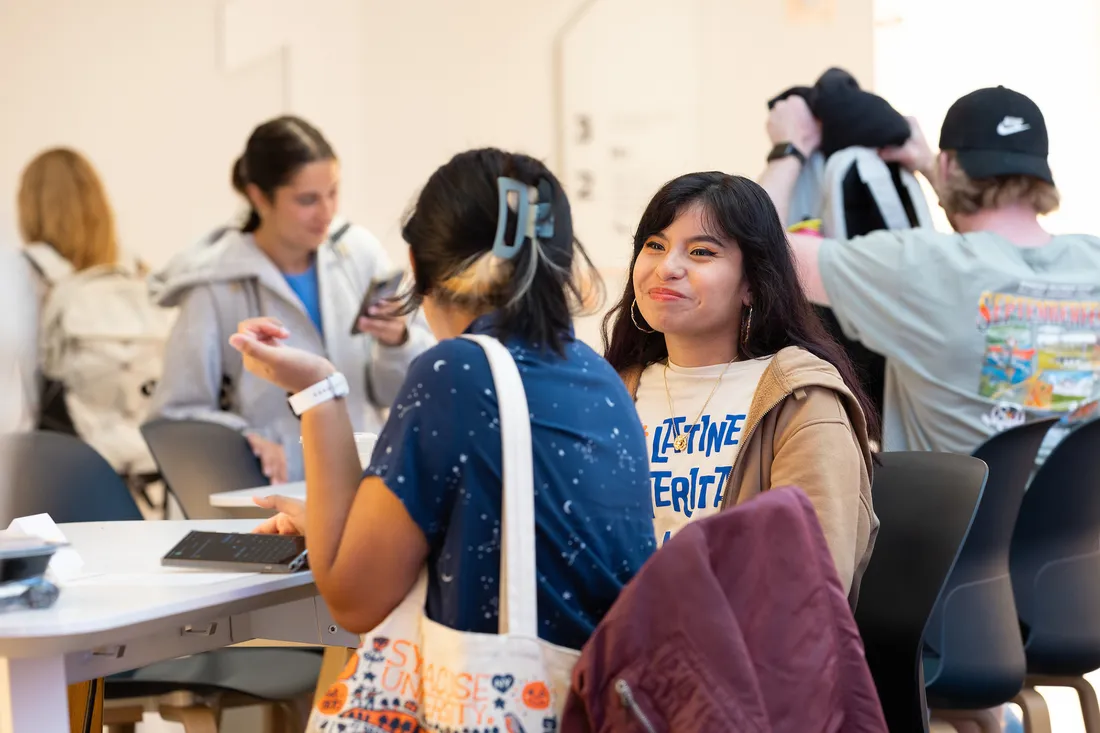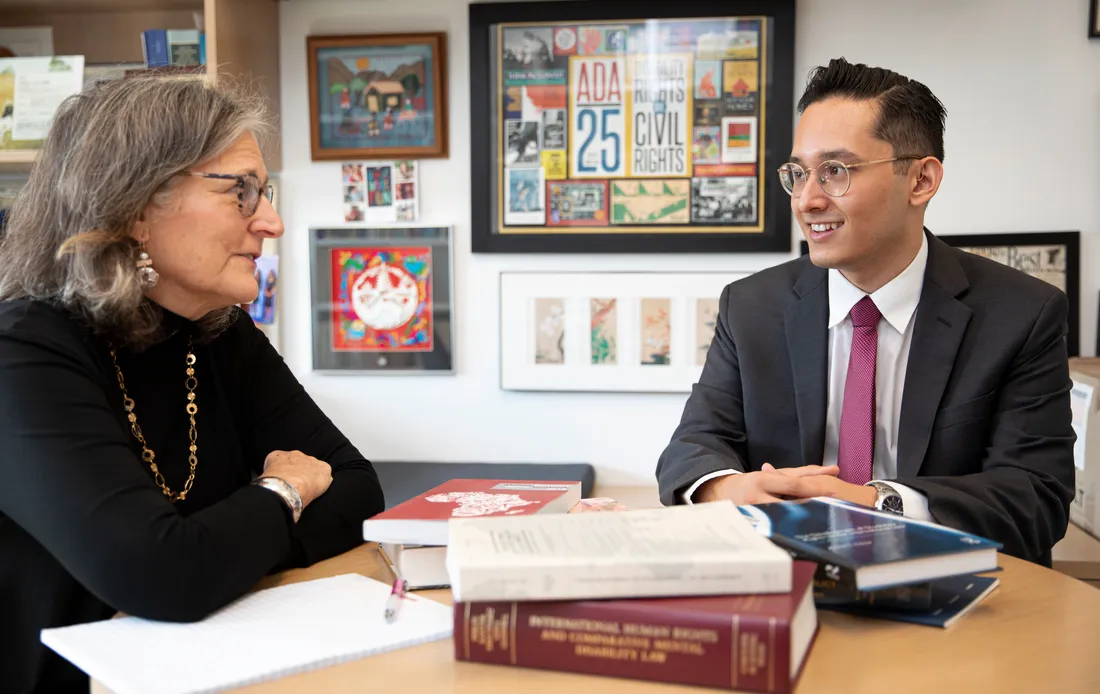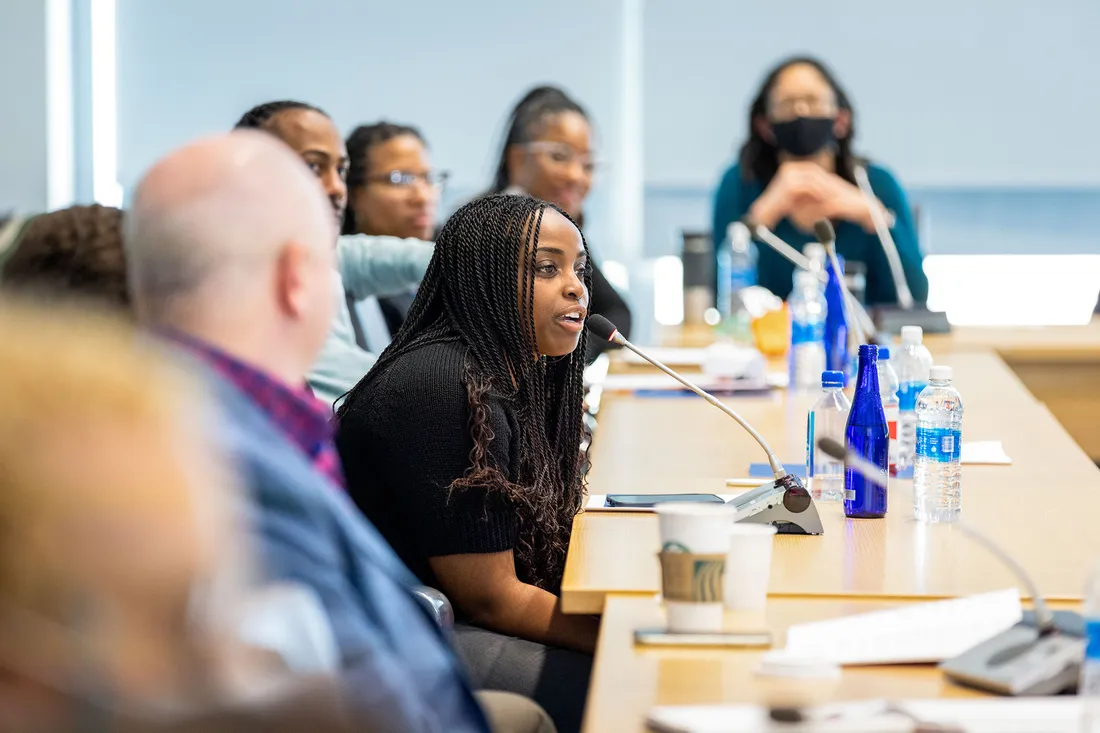
Syracuse University’s Lender Center for Social Justice provides opportunities for students and faculty to work together across academic disciplines on initiatives that address issues of social justice and inequity.
The forces that affect social justice—fair and equal access to opportunities, resources and rights—are multifaceted and interconnected. Consider, for example, the range of economic and social disparities that contribute to school children’s unequal access to fresh foods. Or the myriad ways artificial intelligence (AI) intersects with systemic biases to increase the vulnerability of certain populations to injustice and violence. Addressing such issues and making meaningful change toward a more just and equitable society calls for the collaborative effort of people with shared commitment and diverse expertise.
The Syracuse University community engages in this kind of work through the Lender Center for Social Justice. The center, founded in 2017 with backing of Marvin Lender ’63 and Helaine (Gold) Lender ’65, supports interdisciplinary, proactive and innovative engagement with issues affecting social justice. It provides opportunities for students and faculty to work together across academic disciplines to research contemporary problems in society and communities and develop initiatives to help solve those problems.
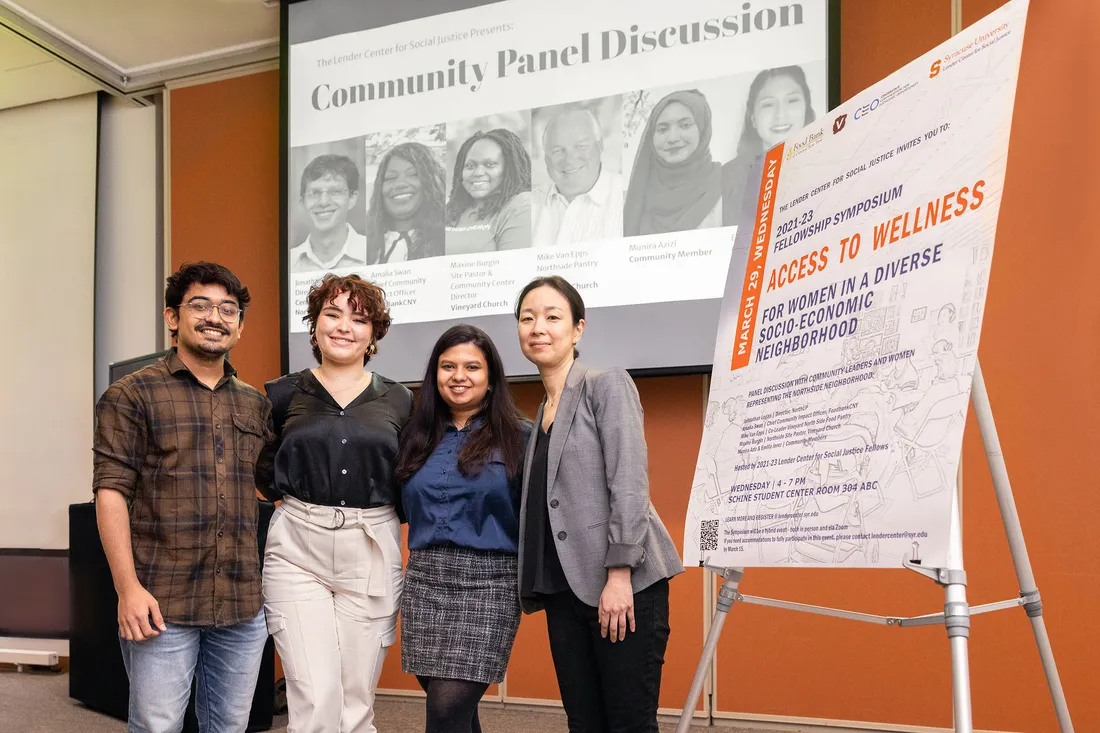
“The Lender Center helped me better understand the connection between research and social justice,” says Ana S. Aponte González ’24, second from left, who worked with an interdisciplinary cohort investigating the accessibility of wellness and community centers.
Bringing Together Many Perspectives
One way this happens is through Lender Center fellowships, which are awarded annually to a faculty member and a cohort of students. One of the projects the Lender Center recently supported was an investigation of food systems in the City of Syracuse and the effort to reduce food insecurity. That group, led by geography and environment professor Jonnell Robinson, included students from the David B. Falk College of Sport and Human Dynamics and the School of Architecture, as well as students studying linguistics, policy and communications in the College of Arts and Sciences and the Maxwell School of Citizenship and Public Affairs.
Another project, led by anthropology professor Mona Bhan, is looking into how AI weapons systems affect war and surveillance. This project draws on insights from students from the School of Education and the College of Engineering and Computer Science, as well from sociology and anthropology programs in Maxwell. One fellowship group studied digital activism, another investigated accessibility of community wellness organizations, and this year, S.I. Newhouse School of Public Communications professor Nausheen Husain will launch a project examining media coverage of Muslim people and communities.
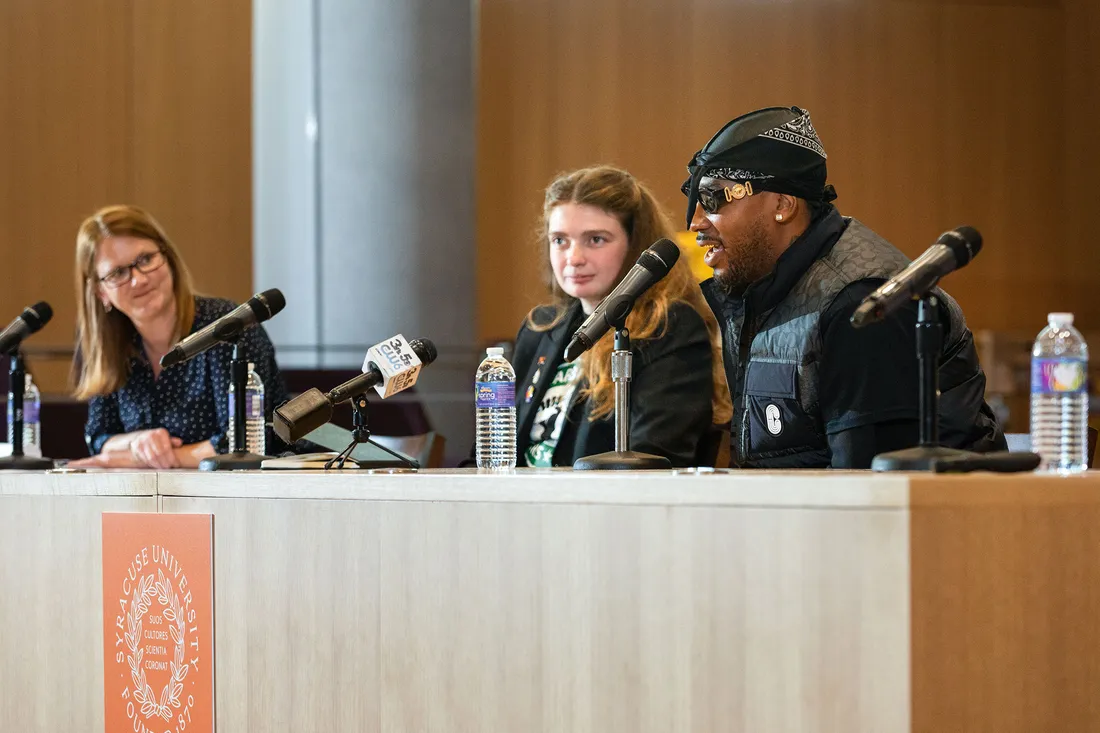
The Lender Center hosts panel discussions around timely topics. Recent conversations have focused on issues around policing, race and disability; creative expression; and the labor movement.
“These are faculty and students from across the University—coming from very different perspectives—who are all deeply committed to the issues they’re working on and to finding ways to reframe these issues and move them in productive ways,” says Kendall Phillips, interim director of the Lender Center. “At heart, the Lender Center is about encouraging an approach that brings more people into the conversation for a richer, broader perspective on what are often longstanding social justice problems.”
Ana S. Aponte González ’24 was one of the students granted a fellowship to work with Professor Seyeon Lee from the College of Visual and Performing Art’s School of Design on the project looking into barriers of access to wellness and community centers. Aponte, who dual majors in communication and rhetorical studies and women’s and gender studies, says the experience helped her see how she could contribute meaningfully toward causes that mattered to her. “This project opened my eyes to different ways one can do advocacy,” she says. “The Lender Center helped me better understand the connection between research and social justice. It’s so important that we do research in and for marginalized communities because without that empirical data, the issues these communities face do not get considered when it comes to policymaking.”
González says the fellowship experience confirmed for her that she wanted to pursue a career in communications for not-for-profit organizations.
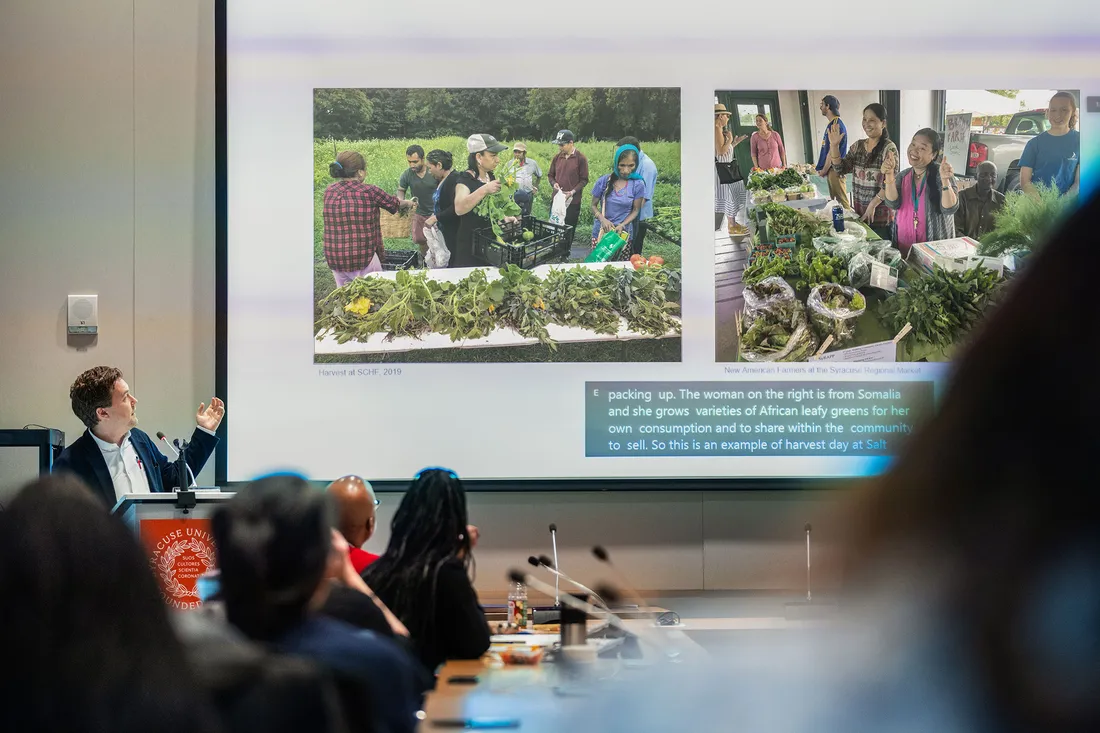
The Lender Center has partnered with the MetLife Foundation to support deep and wide-reaching engagement with issues related to the racial wealth gap.
Innovative Collaboration on Longstanding Issues
The Lender Center also brings together scholars, leaders and experts for interdisciplinary panel discussions and community conversations around timely topics. Conversations have focused on issues around policing, race and disability; creative expression; and the labor movement.
Bringing together a diversity of thought can lead to more holistic and innovative solutions to complex problems and foster the networking and knowledge-sharing among experts that can amplify the impact of the initiative.
— Professor Willie Reddic
And, in one of the most ambitious expressions of the center’s guiding ethos, the center recently partnered with the MetLife Foundation to support deep and wide-reaching engagement with issues related to the racial wealth gap: the persistent discrepancy in assets that maps to race and ethnicity. It’s a problem widely recognized as both caused by and exacerbating of many other social inequities, and the multiyear project invites scholars across disciplines to apply their expertise and collaboratively seek new insights and solutions to this issue.
Willie Reddic, professor of accounting in the Martin J. Whitman School of Management, spearheads one of the projects recently awarded a MetLife Foundation grant. His team includes accounting professor Susan Albring and Patricia Crawford, a doctoral candidate of finance at the University of Rhode Island. “Bringing together a diversity of thought can lead to more holistic and innovative solutions to complex problems and foster the networking and knowledge-sharing among experts that can amplify the impact of the initiative,” they say. “Our project focuses on disparities in health insurance costs, particularly in underserved and underrepresented communities. We look forward to collaborating with experts from various fields to ensure a comprehensive and effective approach to addressing this critical issue.”
Engaged Citizenship, Experiential Learning, Public Impact
Marcelle Haddix, founding co-director of the Lender Center (with Phillips), says the center plays an important role in helping the University achieve its goals. “As we launch our new academic strategic plan, we recognize that sustainable implementation requires it be embedded in the infrastructure of our University,” she explains. “When you look at the differentiators of our academic plan—engaged citizenship, experiential learning, and public impact through scholarship, research, teaching and student engagement—these are areas of distinction where the Lender Center is paramount.”

